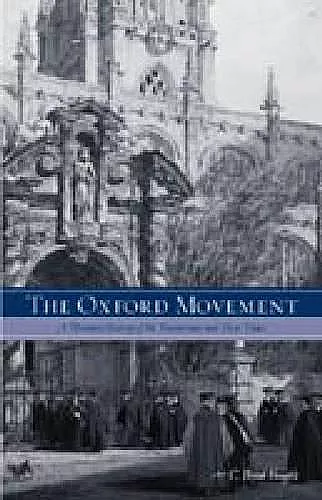The Oxford Movement
A Thematic History of the Tractarians and Their Times
Format:Hardback
Publisher:Pennsylvania State University Press
Published:18th Feb '03
Currently unavailable, and unfortunately no date known when it will be back
This hardback is available in another edition too:
- Paperback£32.95(9780271023946)

Well over a century and a half after its high point, the Oxford Movement continues to stand out as a powerful example of religion in action. Led by four young Oxford dons—John Henry Newman, John Keble, Richard Hurrell Froude, and Edward Pusey—this renewal movement within the Church of England was a central event in the political, religious, and social life of the early Victorian era. This book offers an up-to-date and highly accessible overview of the Oxford Movement.
Beginning formally in 1833 with John Keble's famous "National Apostasy" sermon and lasting until 1845, when Newman made his celebrated conversion to Roman Catholicism, the Oxford Movement posed deep and far-reaching questions about the relationship between Church and State, the Catholic heritage of the Church of England, and the Church's social responsibility, especially in the new industrial society. The four scholar-priests, who came to be known as the Tractarians (in reference to their publication of Tracts for the Times), courted controversy as they attacked the State for its insidious incursions onto sacred Church ground and summoned the clergy to be a thorn in the side of the government.
C. Brad Faught approaches the movement thematically, highlighting five key areas in which the movement affected English society more broadly—politics, religion and theology, friendship, society, and missions. The advantage of this thematic approach is that it illuminates the frequently overlooked wider political, social, and cultural impact of the movement. The questions raised by the Tractarians remain as relevant today as they were then. Their most fundamental question—"What is the place of the Church in the modern world?"—still remains unanswered.
“Anyone trying to understand why the institutions of Christianity refuse to disappear and why some of its branches—well, its key branch, which remains Roman Catholicism—continue to be obstinate and even belligerent in the face of growing secular tolerance on key social issues like gay rights will find the history of the Oxford Movement remarkably pertinent. It is Faught’s great achievement as a historian and communicator that he leads readers through all the theological and metaphysical complications and occasional muddle with such writerly clarity and scholarly élan.”
—John Fraser National Post
“The Oxford Movement is something of a niche volume, but it illuminates that niche nicely.”
—Alan Cochrum Morning Star-Telegram
“The strength of this book lies in its thematic approach to the Oxford movement and its influence on English society.”
—R. M. Kollar Choice
“This is a tightly written, well-argued, and thoroughly annotated work. It should become a required text for anyone teaching in this area.”
—Mary Eleanor Hill Anglican Theological Review
“Faught’s training as a journalist as well as a historian makes the story unfold in a brisk and compelling manner.”
—Pegram Johnson III Anglican and Episcopal History
“To those familiar with the Oxford Movement, this book provides some additional details and suggests a few variant interpretations, particularly in relation to the movement in the second half of the nineteenth century.”
—John T. Ford Religious Studies Review
“In sum, this study provides an accessible but conventional introduction to an important and still controversial episode in Victorian religion.”
—William Whitla University of Toronto Quarterly
ISBN: 9780271022499
Dimensions: 216mm x 140mm x 16mm
Weight: 399g
200 pages